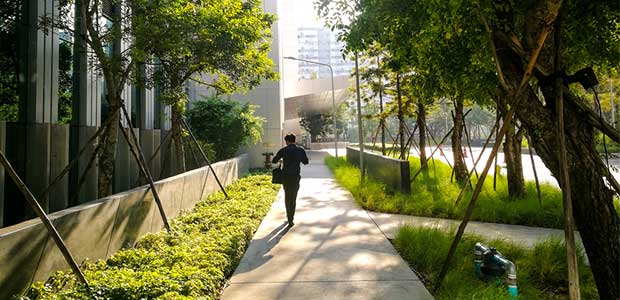
Cities Prepare for Green Initiatives Post-Coronavirus
For many policymakers, efforts to reopen the economy overlap with the need for green initiatives. As various regions prepare for the bumpy road ahead, the focus on green living and environmental protection has never been more crucial.
- By Jenna Tsui
- May 19, 2020
The COVID-19 pandemic is a life-changing event that will be prominent for the foreseeable future. As countries and cities prepare to lift lockdown or stay-at-home orders, many officials are looking for ways to enforce social distancing while restarting economies.
For many policymakers, these efforts overlap with the need for green initiatives. As various regions prepare for the bumpy road ahead, the focus on green living and environmental protection has never been more crucial.
If your city is easing its way out of quarantine, you may be wondering how it will safely do so. Through pedestrian and cycling areas, green space and renewable energy usage, cities are taking on green initiatives as the safest paths into the future for all citizens.
Pedestrian and Cycling Space
Cities across the world are taking initial steps to ease the transition into living in the post-coronavirus era. Though stay-at-home orders remain strong in some areas, going outside has never felt more important.
From New York to Paris to Bogotá, mayors are focusing on expanding sidewalks and cycling areas so citizens can properly social distance while still getting exercise and fresh air. Mayor Bill de Blasio plans to close off 40 miles of roads in New York City to allow for more recreational use. Since motor vehicle usage is down because of the quarantines, expanding areas for walking is a beneficial move.
Expanding pedestrian areas provides citizens with the space they need to exercise. It also further limits the number of cars in these designated areas. This decrease could facilitate a reduction in carbon emissions should it continue for a prolonged period.
This change is happening elsewhere in the world, too. Bogotá, Paris, Mexico City and Milan are several other cities focusing on pedestrian and cycling needs. In one instance, Paris Mayor Anne Hidalgo recently announced plans to allocate over 400 miles of roadways to cyclists after its lockdown lifts.
The changing focus on pedestrian walkways and cycling spaces shifts the conversation to healthier living, both on an individual and global scale. Emphasizing physical activity during the coronavirus era can help reduce vehicle usage.
Green Space
Green space is abundant in the natural world. In cities, though, it becomes more scarce within the local infrastructure. Accessibility, funding and the physical locations for green spaces are three factors cities must consider to take on this initiative.
Planting trees is a proactive idea for potentially increasing lifespans in a city like Philadelphia. Growing more trees is a beneficial plan for keeping air quality at a healthy level in urban areas with high amounts of pollution. However, green space also encompasses places like parks or gardens. Having a well-rounded approach to green space in cities will be what ultimately helps individuals during and after this crisis.
According to a recent Harvard study, pollution can cause higher death rates from COVID-19 since the disease is a respiratory illness. Pollution affects the lungs, which emphasizes the need for more green space. With more natural areas, air contamination can decrease, and individuals can stay at a low risk for contracting the virus.
To implement green spaces, cities can look into playgrounds, parks and community gardens. Mass initiatives for planting trees can also be effective. For instance, city developers can use mechanically stabilized earth (MSE) in a community garden to enforce it as part of the infrastructure. With structures like this one, green space becomes more of a standard necessity than a display.
Renewable Energy
The Harvard study highlights the need for green space, but it also shows the need for renewable energy. With lower emission levels, pollution will do less harm to city residents—both during and after the pandemic.
The renewable energy industry is currently doing well in some parts of the world. As the market for fossil fuels remains volatile, sustainable energy sources like solar or wind are becoming the energy industry's favorites. Plus, renewables are reliable. Wide-scale implementation can also add thousands of jobs to the market and give the economy a boost. Renewable energy maintenance is also minimal, which is helpful in meeting social distancing requirements on the job.
In England, officials are looking into plans to retrofit homes with renewable energy solutions. This step would entail change on a country-wide level by providing residents with sustainable resources. This green initiative is critical. The world needs renewable energy on an environmental level, but it can also provide citizens with clean air and jobs. And currently, these are two missing factors for many cities and countries during this pandemic.
If the market for renewable power continues growing, more cities will start investing. Then, pollution levels will decrease, bringing down health risks as well.
Short- and Long-Term Benefits
As cities around the world take on these green initiatives, citizens will start seeing the benefits. Each aspect has short- and long-term effects, which is why they work for the current state of the pandemic and the post-coronavirus era.
Regarding the immediate effects, these initiatives facilitate more exercise and offer better air quality. As the coronavirus continues, the long-term benefits include reduced pollution levels and fewer health risks. Global economies can thrive with the addition of green jobs, and citizens can continue adjusting to life after the COVID-19 pandemic in a healthier way.
About the Author
Jenna Tsui is a Texan journalist who co-owns The Byte Beat blog. She writes about the latest news in sustainability, culture, technology and more. Check out her work on TBB or follow her on Twitter @jenna_tsui .